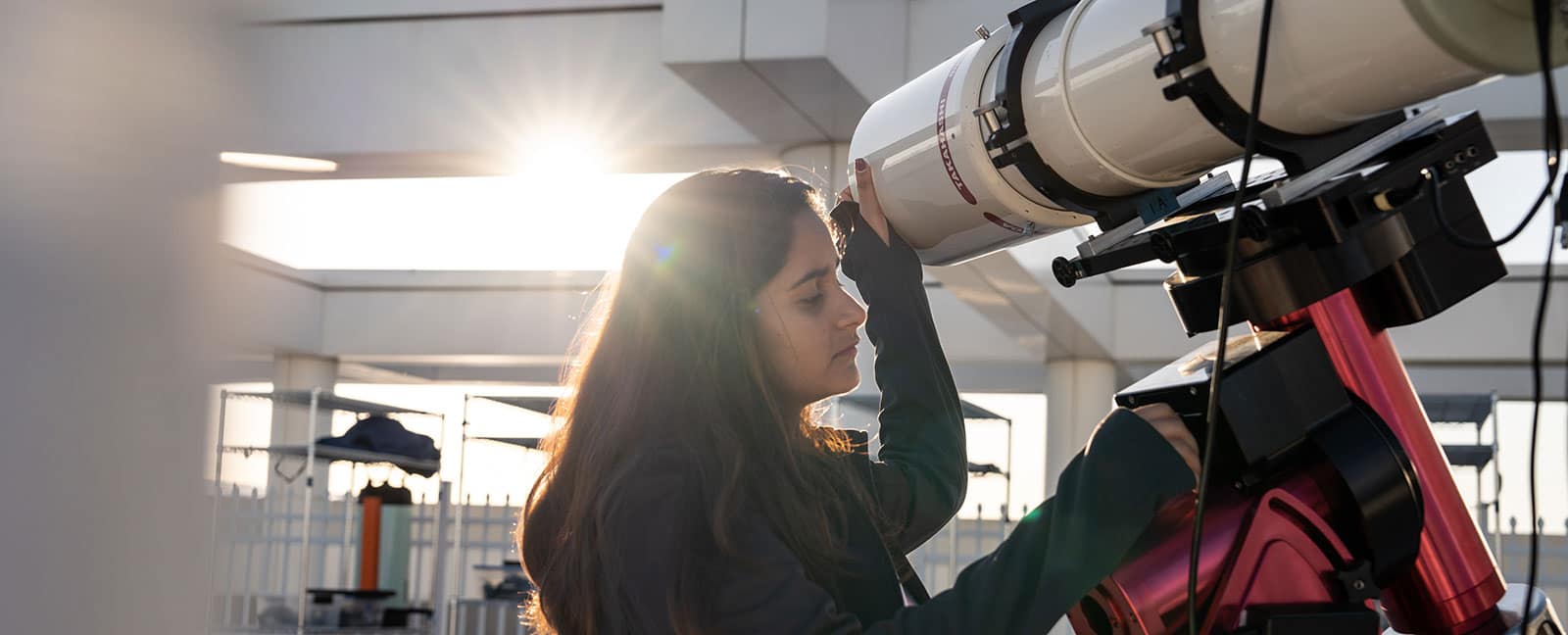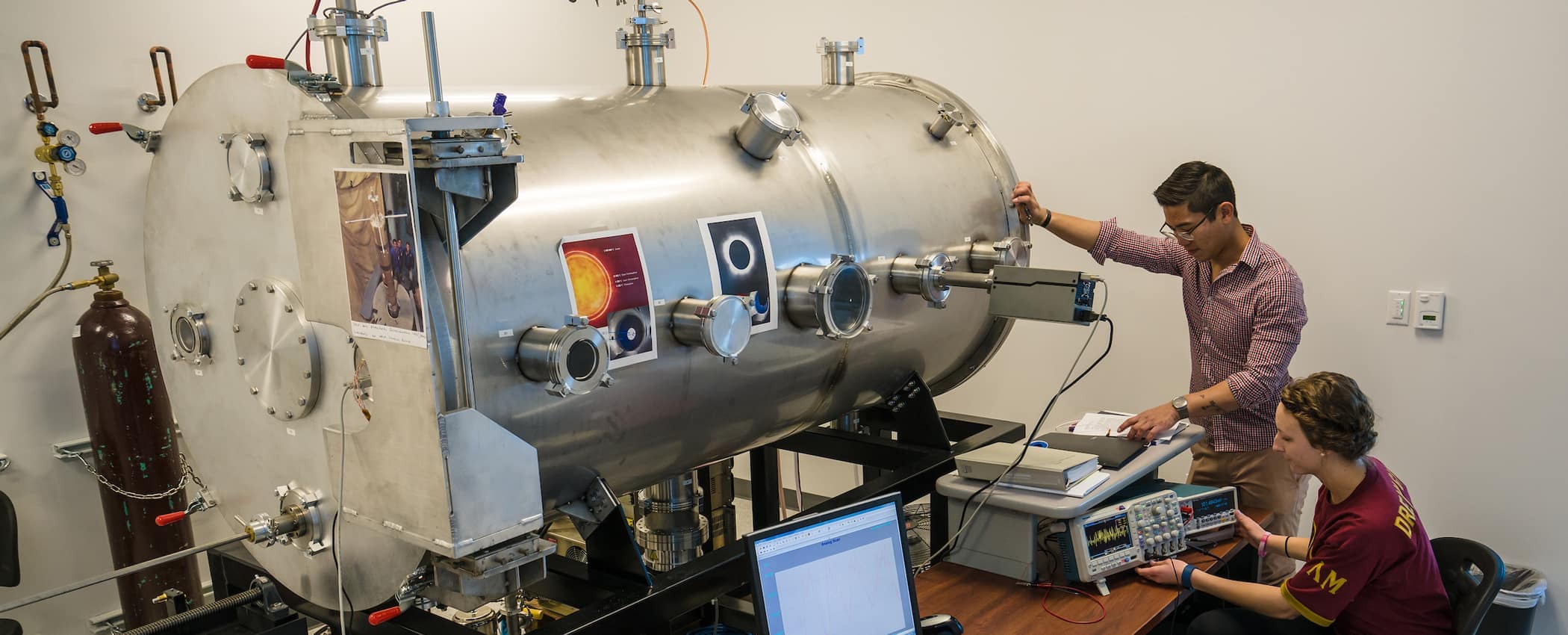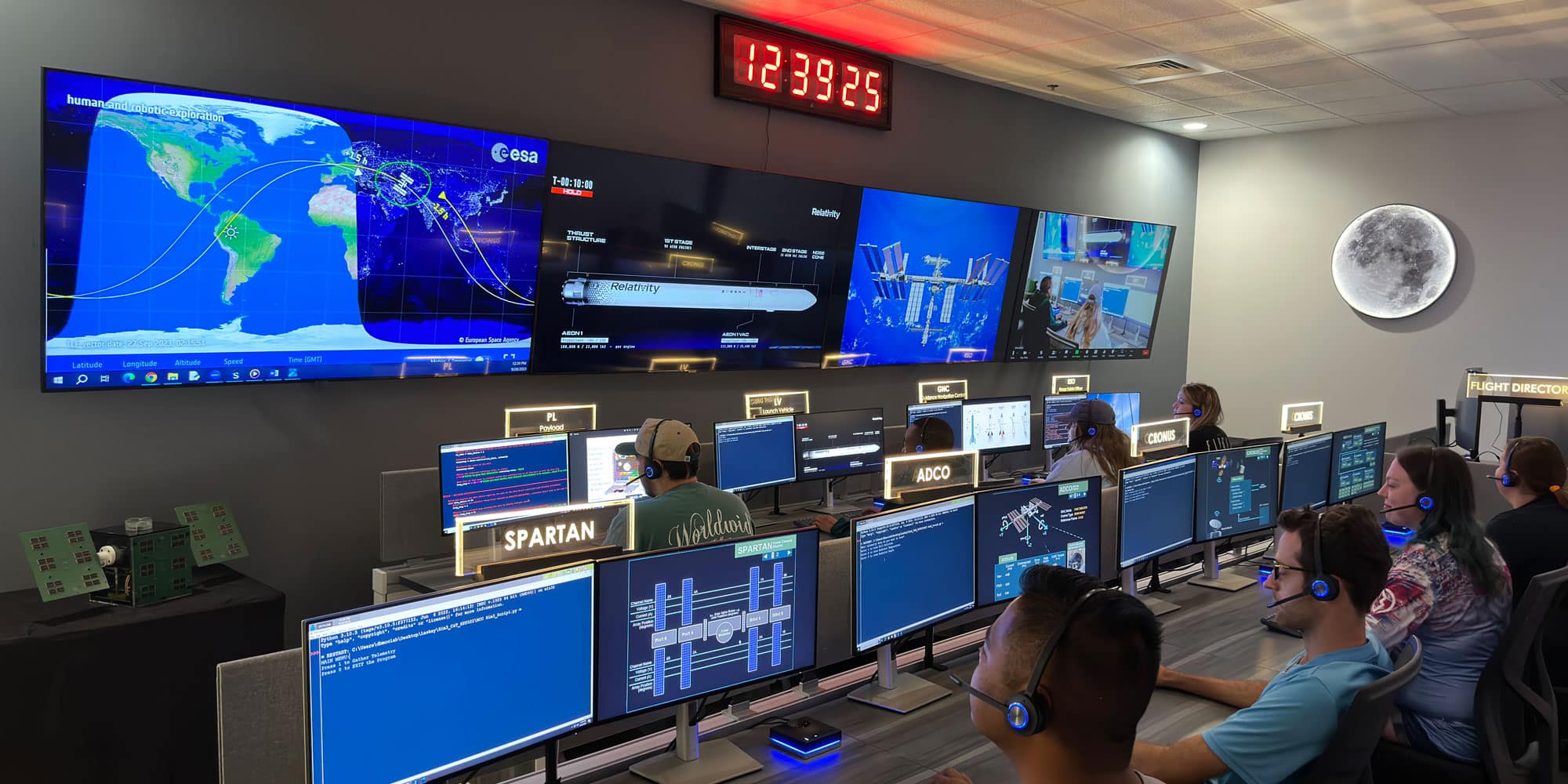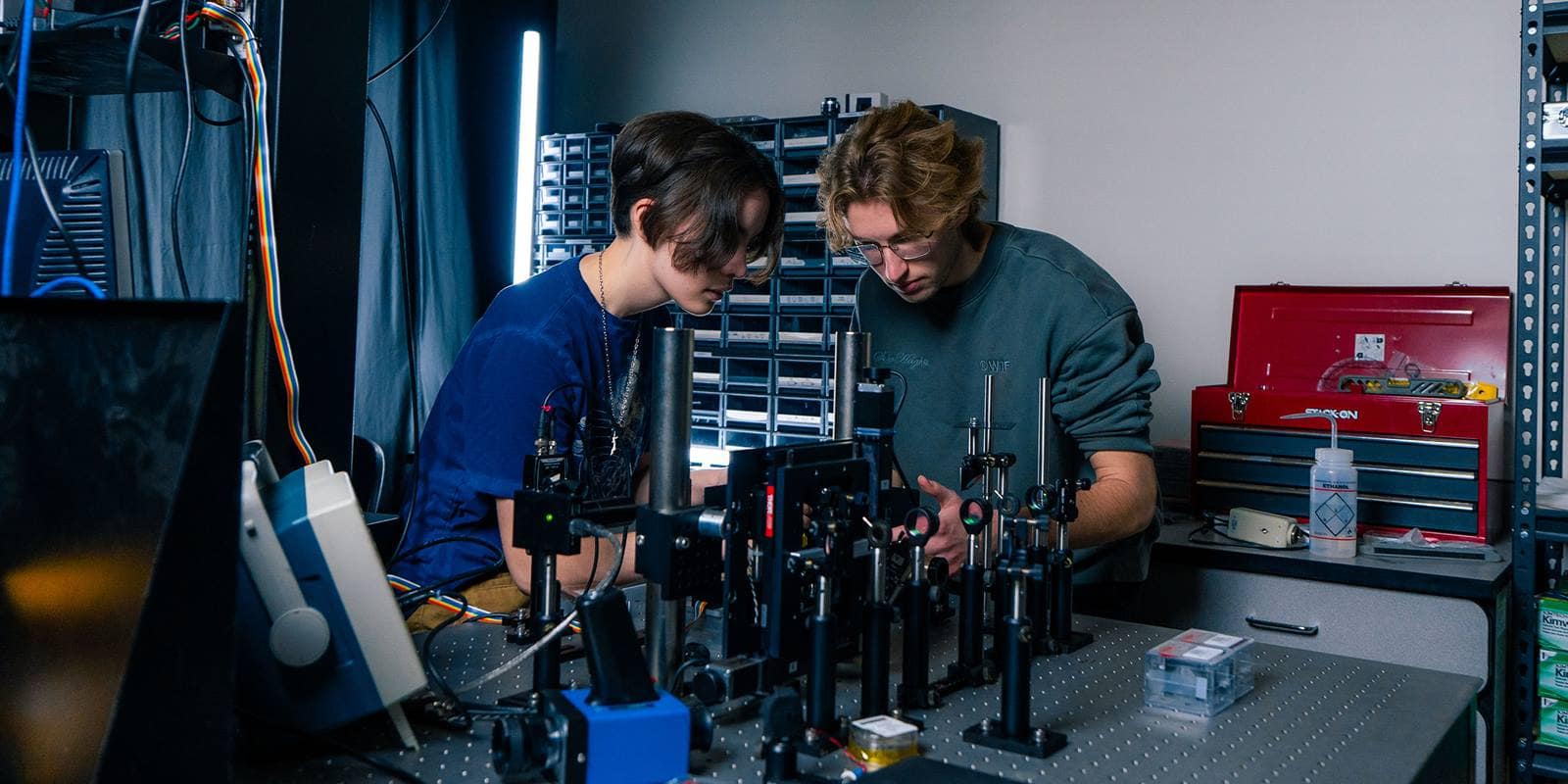
Bachelor of Science in
Space Physics
The B.S. in Space Physics allows students to explore the fundamental forces in nature by investigating atomic, nuclear and elementary particle systems.
About the Bachelor of Science in Space Physics
As the commercial space sector continues to grow, Embry‑Riddle’s Bachelor of Science in Space Physics is the only undergraduate space physics program in the U.S. dedicated to shaping well-educated students to support scientific missions. It is designed for students who demonstrate strong math and science skills with an interest in space and physics research. Space Physics majors work under the direction of faculty who are research-active physicists who share the passion for understanding the universe and enhancing technological developments.
The Space Physics program engages students in the scientific side of space exploration through studies of the Earth-sun environment, atmospheric sciences, aurorae, planetary sciences, space weather, laboratory plasma physics, stellar and high-energy astrophysics, gravitational physics, exoplanets, and exotic propulsion. Space Physics students will have access to campus-specific research areas such as our Laser Interferometer Gravitational-Wave Observatory - LIGO (Prescott Campus) and the Ritchey-Chrétien reflecting telescope (Daytona Beach Campus). Graduates emerge from the program ready to work in applied research careers as vital contributors in the growing field of space exploration.
Student Learning Outcomes
While earning a Space Physics degree, you will have the opportunity to:
- Design and conduct experiments, as well as analyze and interpret data.
- Explore prevailing models in the primary areas of physics.
- Gain the technical expertise required for developing new physical models.
- Understand the current state of knowledge of the physical universe.
Space Physics Career Opportunities
Careers and Employers
Embry-Riddle graduates are prepared to enter the industry as researchers and systems engineers or continue to further education in graduate school to pursue research careers, in space physics and related areas, with a high placement rate within a year of graduation.
Students earning a degree in Space Physics often accept employment offers from top companies such as Lockheed Martin, MIT – Lincoln Laboratory, the Air Force Institute of Technology and the Harvard-Smithsonian Center for Astrophysics.
Space Physics Salary Information
Receiving a degree in Space Physics from Embry-Riddle provides the opportunity for competitive salaries, averaging $60,500 annually as of 2023.
DETAILS
This offering is available at the following campuses. Select a campus to learn more.
About Space Physics at the Daytona Beach, FL Campus
Part of the Department of Physical Sciences in the College of Arts and Sciences, the B.S. in Space Physics emphasizes the physics of the solar-terrestrial and distant-space environments. Students learn how to study the magnetic and astrophysical phenomena that occur in outer space, in the upper atmosphere of planets and on the sun.
Embry-Riddle houses Florida’s largest university-based research telescope, an instrumented 1-meter Ritchey-Chrétien reflecting telescope. Adjacent to the telescope is a helioscope to observe solar activity, providing students with hands-on experience utilizing ground-based instruments to study space phenomena.
Space Physics Information
- Credits: 120
- Online or In-Person: In-Person
- Thesis: Senior Project (3 credits)
Helpful Links
- Tour our Daytona Beach Campus
- Discover the Department’s Faculty
- Explore the Fields of Study: Applied Science & Space
- Find Related Clubs & Organizations
Student Learning Outcomes
Students will:
- Apply knowledge of mathematics and science to solve problems in modern space physics and related scientific areas.
- Use appropriate research methods to conduct experiments.
- Identify, formulate, and solve scientific problems.
- Communicate effectively with a broad range of audiences by writing reports/papers and making oral presentations.
- Acquire information about new scientific problems and techniques for their solution, using appropriate learning strategies.
- Function effectively on a team whose members together provide leadership, create a collaborative and inclusive environment, establish goals, plan tasks, and meet objectives.
General Education Requirements
For a full description of Embry-Riddle General Education guidelines, please see the General Education section of this catalog. These minimum requirements are applicable to all degree programs.
| Communication Theory & Skills | 9 | |
| Humanities - Lower level * | 3 | |
| Social Sciences - Lower level * | 3 | |
| Humanities or Social Sciences - Lower or Upper level * | 3 | |
| Humanities or Social Sciences - Upper level * | 3 | |
| Computer Science (EGR 115) | 3 | |
| Mathematics (MA 241, MA 242) | 8 | |
| Physical and Life Sciences (PS 226, PS 226L & PS 227) | 7 | |
| Total Credits | 39 | |
| Program Core | ||
| EP 101 | Current Topics in Space Science | 1 |
| Mathematics | ||
| MA 243 | Calculus and Analytical Geometry III | 4 |
| MA 345 | Differential Equations and Matrix Methods | 4 |
| MA 441 | Mathematical Methods for Engineering and Physics I | 3 |
| MA 442 | Mathematical Methods for Engineering and Physics II | 3 |
| Physical Science | ||
| CHM 110 | General Chemistry I | 3 |
| CHM 110L | General Chemistry I Laboratory | 1 |
| EP 320 | Electro-Optical Engineering | 3 |
| PS 228 | Physics III | 3 |
| PS 228L | Physics III Laboratory | 1 |
| PS 303 | Modern Physics | 3 |
| PS 305 | Modern Physics Laboratory | 1 |
| PS 320 | Classical Mechanics | 3 |
| PS 400 | Senior Physics Laboratory I | 3 |
| PS 405 | Atomic Nuclear Physics | 3 |
| EP 492 | Senior Project (Or Technical Elective**) | 3 |
| Space Physics | ||
| EP 393 | Spaceflight Dynamics | 3 |
| EP 400 | Thermodynamics and Statistical Mechanics | 3 |
| EP 410 | Space Physics | 3 |
| EP 411 | Space Physics II | 3 |
| EP 420 | Planetary Science | 3 |
| EP 440 | Engineering Electricity and Magnetism | 3 |
| EP 455 | Quantum Mechanics | 3 |
| PS 214 | Introduction to Space Weather | 3 |
| Technical Electives *** | 6 | |
| Open Electives | 9 | |
| Total Credits | 81 | |
| Total Degree Credits | 120 | |
- *
Embry-Riddle courses in the General Education categories of Communication Theory and Skills, Humanities and Social Sciences and the Technical Electives may be chosen from the approved list of courses, assuming prerequisite requirements are met. Courses from other institutions are acceptable if they fall into these broad categories and are at the level specified in the Space Physics vertical outline.
- **
Please see Program Coordinator for approval of Technical Elective.
- ***
Choose from AA/AE/CEC/CIV/CS/EE/EGR/EP/ES/MA/ME/PS/SE 300-400 level.
Suggested Plan of Study
| Year One | ||
|---|---|---|
| Credits | ||
| EP 101 | Current Topics in Space Science | 1 |
| MA 241 | Calculus and Analytical Geometry I | 4 |
| MA 242 | Calculus and Analytical Geometry II | 4 |
| CHM 110 | General Chemistry I | 3 |
| CHM 110L | General Chemistry I Laboratory | 1 |
| Communication Theory and Skills * | 6 | |
| PS 226 | Physics I | 3 |
| PS 226L | Physics I Laboratory | 1 |
| Lower-Level Humanities * | 3 | |
| Lower-Level Social Sciences * | 3 | |
| Credits Subtotal | 29.0 | |
| Year Two | ||
| EGR 115 | Introduction to Computing for Engineers | 3 |
| MA 243 | Calculus and Analytical Geometry III | 4 |
| MA 345 | Differential Equations and Matrix Methods | 4 |
| Communication Theory and Skills * | 3 | |
| PS 214 | Introduction to Space Weather | 3 |
| PS 227 | Physics II | 3 |
| PS 228 | Physics III | 3 |
| PS 228L | Physics III Laboratory | 1 |
| Lower or Upper-Level Humanities or Social Science Elective * | 3 | |
| Open Electives | 3 | |
| Credits Subtotal | 30.0 | |
| Year Three | ||
| EP 320 | Electro-Optical Engineering | 3 |
| EP 393 | Spaceflight Dynamics | 3 |
| EP 400 | Thermodynamics and Statistical Mechanics | 3 |
| MA 441 | Mathematical Methods for Engineering and Physics I | 3 |
| MA 442 | Mathematical Methods for Engineering and Physics II | 3 |
| PS 303 | Modern Physics | 3 |
| PS 305 | Modern Physics Laboratory | 1 |
| PS 320 | Classical Mechanics | 3 |
| Open Elective | 6 | |
| Upper-Level Humanities or Social Science Elective * | 3 | |
| Credits Subtotal | 31.0 | |
| Year Four | ||
| EP 410 | Space Physics | 3 |
| EP 411 | Space Physics II | 3 |
| EP 420 | Planetary Science | 3 |
| EP 440 | Engineering Electricity and Magnetism | 3 |
| EP 455 | Quantum Mechanics | 3 |
| EP 492 | Senior Project | 3 |
| PS 400 | Senior Physics Laboratory I | 3 |
| PS 405 | Atomic Nuclear Physics | 3 |
| Technical Electives | 6 | |
| Credits Subtotal | 30.0 | |
| Credits Total: | 120 | |
- *
Embry-Riddle courses in the General Education categories of Communication Theory and Skills, Humanities and Social Sciences and the Technical Electives may be chosen from the approved list of courses, assuming prerequisite requirements are met. Courses from other institutions are acceptable if they fall into these broad categories and are at the level specified in the Space Physics vertical outline.
Get Started Now:
Summary
120 Credits
Estimate your tuition by using the Tuition Calculator
View Financial Aid Information
Learn about our General Education
Find out about transferring credits to this degree
Learn more about our Veterans & Military benefits
View our Academic Calendar
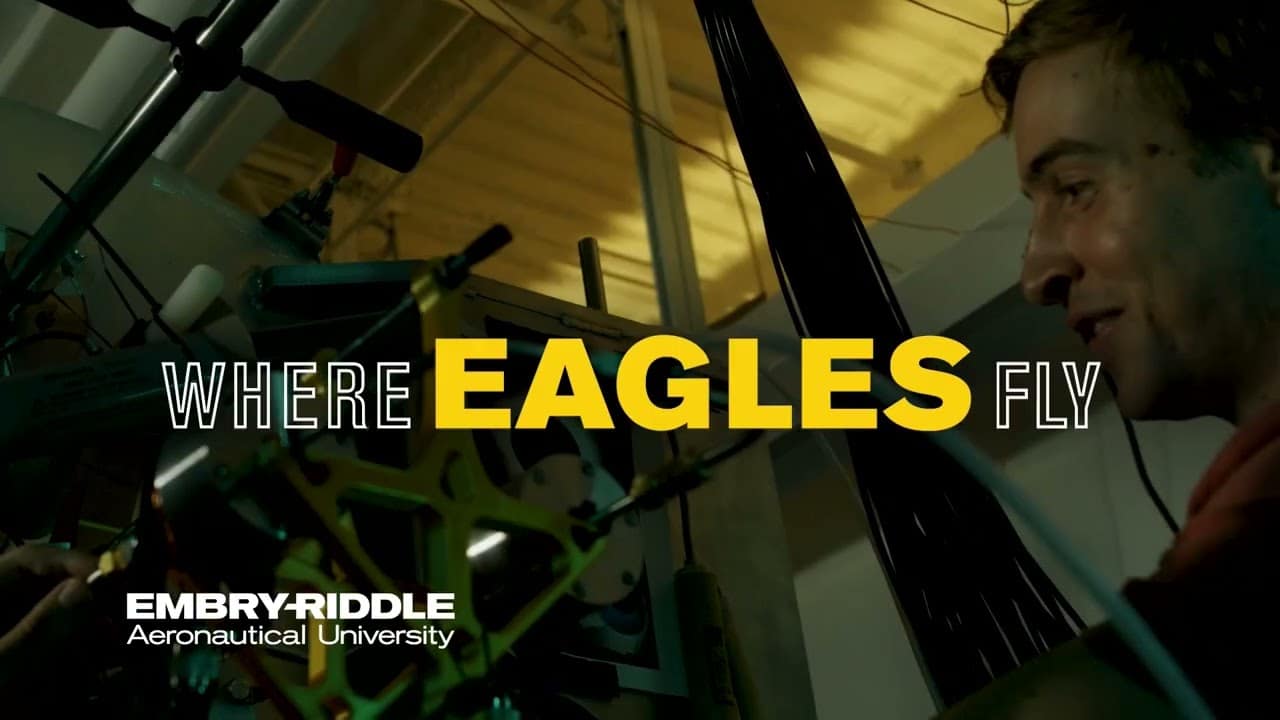
About Space Physics at the Prescott, AZ Campus
The Bachelor of Science in Space Physics, housed in the Department of Physics and Astronomy in the College of Arts and Sciences, lets students explore the fundamental forces in nature through investigating astrophysics, relativity and gravitation, as well as atomic, nuclear and elementary particle systems.
At the Prescott Campus, students are immersed in designing experiments and building the equipment to conduct their physics research. Students have access to labs for studying optics, exotic propulsion and cosmic rays, including the Laser Interferometer Gravitational-Wave Observatory (LIGO) and the Prescott Observatory Complex.
Tracks/Specialties and/or Certificates
Students pursuing a Space Physics degree have the option to complete one of the following specialties:
- Astroparticle Physics
- Exotic Propulsion
- Gravitational Physics
Space Physics Information
- Credits: 120
- Online or In-Person: In-Person
- Thesis: Research Thesis (6 credits)
Helpful Links
- Tour our Prescott Campus
- Discover the Department's Faculty
- Explore the Fields of Study: Applied Science & Space
- Find Related Clubs & Organizations
Student Learning Outcomes
Students will:
- Apply knowledge of mathematics and science to solve problems in modern space physics and related scientific areas.
- Use appropriate research methods to conduct experiments.
- Formulate solutions to scientific problems through the construction of physical models.
- Communicate effectively with a broad range of audiences by writing reports/papers and making oral presentations.
- Acquire information about new scientific problems and techniques for their solution, using appropriate learning strategies.
- Function effectively on a team whose members together provide leadership, create a collaborative and inclusive environment, establish goals, plan tasks, and meet objectives.
Degree Requirements
The Bachelor of Science in Space Physics is a 120 credit hour program that can be completed in eight semesters. The list of courses below comprises the complete requirements for the degree of Bachelor of Science in Space Physics. Before registering for a course, check the course description section of this catalog to ensure that all prerequisites and/or corequisites are met. It is recommended that students earn a C grade or better in the prerequisite courses. Students must have a minimum cumulative GPA of 2.0 in core PS courses.
Students may not pursue both a Space Physics B.S. degree and an Astronomy B.S. degree. However, also note that the degree requirements for the first three semesters of both degree programs can be satisfied with the same courses. Thus, a student who is making appropriate progress in either the Space Physics or Astronomy degree programs can switch to the other program after the third semester with a complete transfer of credit from one program to the other.
Program Requirements
General Education
Embry-Riddle degree programs require students to complete a minimum of 36 hours of General Education coursework. For a full description of Embry-Riddle General Education guidelines, please see the General Education section of this catalog.
Students may choose other classes outside of their requirements, but doing so can result in the student having to complete more than the degree's 120 credit hours. This will result in additional time and cost to the student.
| Communication Theory and Skills | 9 | |
| Computer Science/Information Technology | 3 | |
| Mathematics | 6 | |
| Physical and Life Sciences (Natural Sciences) | 6 | |
| Humanities and Social Sciences | 12 | |
3 hours of lower-level Humanities | ||
3 hours of lower-level Social Science | ||
3 hours of lower-level or upper-level Humanities or Social Science | ||
3 hours of upper-level Humanities or Social Science | ||
| Total Credits | 36 | |
Space Physics Core (97 Credits)
The following course of study outlines the quickest and most cost-efficient route for students to earn their B.S. in Space Physics. Students are encouraged to follow the course of study to ensure they complete all program required courses and their prerequisites within four years.
Courses in the core with a # will satisfy your general education requirements.
| CHM 110 & 110L | General Chemistry I and General Chemistry I Laboratory # | 4 |
| CS 118 | Fundamentals of Computer Programming # | 3 |
| or EGR 115 | Introduction to Computing for Engineers | |
| General Education - Communication Theory and Skills # | 9 | |
| General Education - Lower-Level Humanities # | 3 | |
| General Education - Upper-Level Humanities or Social Science # | 3 | |
| General Education - Lower-Level Social Science # | 3 | |
| General Education - Social Science Upper-Level Elective # | 3 | |
| MA 241 | Calculus and Analytical Geometry I # | 4 |
| MA 242 | Calculus and Analytical Geometry II # | 4 |
| MA 243 | Calculus and Analytical Geometry III | 4 |
| MA 335 | Introduction to Linear and Abstract Algebra | 3 |
| MA 345 | Differential Equations and Matrix Methods | 4 |
| MA 441 | Mathematical Methods for Engineering and Physics I | 3 |
| MA 442 | Mathematical Methods for Engineering and Physics II | 3 |
| PS 204 | General Astronomy | 3 |
| PS 215 | Physics I # | 3 |
| PS 216 | Physics I Laboratory | 1 |
| PS 208 | Physics II | 3 |
| PS 221 | Intermediate Physics Laboratory | 2 |
| PS 219 | Physics III | 3 |
| PS 222 | Intermediate Astronomy | 3 |
| PS 232 | Computational Methods in the Physical Sciences | 3 |
| PS 303 | Modern Physics | 3 |
| PS 315 | Modern Physics Laboratory | 2 |
| PS 321 | Classical Mechanics I | 3 |
| PS 330 | Electricity and Magnetism I | 3 |
| PS 350 | Quantum Mechanics I | 3 |
| PS 380 | Optics Laboratory | 3 |
| PS 405 | Atomic Nuclear Physics | 3 |
| PS 430 | Thermodynamics and Statistical Mechanics | 3 |
| Total Credits | 97 | |
Research Thesis (6 Credits)
| PS 490 | Senior Research Thesis, Part I | 3 |
| PS 491 | Senior Research Thesis, Part II | 3 |
Technical Electives (12 Credits)
In their senior year, eligible students will choose a thesis project in association with a supervising faculty member. Students who are not eligible to take PS 490 and PS 491 will instead take 6 credits of technical electives selected from the list below. Eligibility for taking PS 490 is described in the prerequisites for the course in the course description section of the catalog.
| Choose from the following: | ||
| MA 412 | Probability and Statistics | 3 |
| MA 435 | Linear and Abstract Algebra II | 3 |
| MA 443 | Complex Variables | 3 |
| PS 322 | Classical Mechanics II | 3 |
| PS 331 | Electricity and Magnetism II | 3 |
| PS 332 | Techniques of Observational Astronomy | 3 |
| PS 340 | Astrophysics I | 3 |
| PS 341 | High Energy Astrophysics | 3 |
| PS 375 | Planetary Science | 3 |
| PS 408 | Astrophysics II | 3 |
| PS 412 | Particle Physics and Cosmology | 3 |
| PS 413 | Particle Physics and Cosmology II | 3 |
| PS 422 | Space Propulsion | 3 |
| PS 435 | Solid State Theory | 3 |
| WX 322 | Space Weather | 3 |
| WX 390 | Atmospheric Physics | 3 |
| WX 420 | Advanced Atmospheric Thermodynamics | 3 |
| Other courses may be approved by the Department Chair - Example: MA or PS Directed Study | ||
Open Electives (5 Credits)
| Open Electives | 5 | |
| Total Credits | 120 | |
- #
General Education Courses
All Army ROTC students are required to complete SS 321 - U.S. Military History 1900-Present (3 credits) in order to commission.
Suggested Plan of Study
The list of courses below comprises the complete requirements for the degree of Bachelor of Science in Space Physics. The list is organized as a “vertical outline” according to the year in which the courses would normally be taken. While it is not a requirement that the courses be taken during the year shown, students should be aware that several courses in each academic year may have prerequisites and/or corequisites. Therefore, it is recommended that students keep their schedule as close as possible to the one shown below. Before registering for a course, check the course description section of this catalog to ensure that all prerequisites and/or corequisites are met. It is recommended that students earn a C grade or better in the prerequisite courses. Students must have a minimum cumulative GPA of 2.0 in core PS courses.
| Freshman Year | ||
|---|---|---|
| Fall | Credits | |
| CHM 110 & 110L |
General Chemistry I | 4 |
| Communication Elective Lower-Level | 3 | |
| MA 241 | Calculus and Analytical Geometry I | 4 |
| PS 215 | Physics I | 3 |
| PS 216 | Physics I Laboratory | 1 |
| UNIV 101 | College Success | (1) |
| Credits Subtotal | 15.0 | |
| Spring | ||
| CS 118 | Fundamentals of Computer Programming | 3 |
or EGR 115
|
Introduction to Computing for Engineers | |
| MA 242 | Calculus and Analytical Geometry II | 4 |
| PS 204 | General Astronomy | 3 |
| PS 208 | Physics II | 3 |
| PS 221 | Intermediate Physics Laboratory | 2 |
| Credits Subtotal | 15.0 | |
| Sophomore Year | ||
| Fall | ||
| Humanities Lower-Level Elective | 3 | |
| MA 243 | Calculus and Analytical Geometry III | 4 |
| PS 219 | Physics III | 3 |
| PS 222 | Intermediate Astronomy | 3 |
| PS 232 | Computational Methods in the Physical Sciences | 3 |
| Credits Subtotal | 16.0 | |
| Spring | ||
| Communication Elective Lower-Level | 3 | |
| MA 335 | Introduction to Linear and Abstract Algebra ** | 3 |
| MA 345 | Differential Equations and Matrix Methods | 4 |
| PS 303 | Modern Physics | 3 |
| PS 315 | Modern Physics Laboratory | 2 |
| Credits Subtotal | 15.0 | |
| Junior Year | ||
| Fall | ||
| MA 441 | Mathematical Methods for Engineering and Physics I | 3 |
| PS 321 | Classical Mechanics I | 3 |
| PS 330 | Electricity and Magnetism I | 3 |
| Social Science Lower-Level Elective | 3 | |
| Technical Elective | 3 | |
| Credits Subtotal | 15.0 | |
| Spring | ||
| Communication Elective Lower-Level | 3 | |
| MA 442 | Mathematical Methods for Engineering and Physics II | 3 |
| PS 350 | Quantum Mechanics I | 3 |
| PS 380 | Optics Laboratory | 3 |
| Technical Elective | 3 | |
| Credits Subtotal | 15.0 | |
| Senior Year | ||
| Fall | ||
| Humanities Upper-Level Elective | 3 | |
| PS 405 | Atomic Nuclear Physics | 3 |
| PS 490 | Senior Research Thesis, Part I | 3 |
| Social Science Upper-Level Elective | 3 | |
| Technical Elective | 3 | |
| Credits Subtotal | 15.0 | |
| Spring | ||
| Open Elective | 5 | |
| PS 430 | Thermodynamics and Statistical Mechanics | 3 |
| PS 491 | Senior Research Thesis, Part II | 3 |
| Technical Elective | 3 | |
| Credits Subtotal | 14.0 | |
| Credits Total: | 120.0 | |
Get Started Now:
Summary
120 Credits
Estimate your tuition by using the Tuition Calculator
View Financial Aid Information
Learn about our General Education
Find out about transferring credits to this degree
Learn more about our Veterans & Military benefits
View our Academic Calendar

Spotlight
RELATED DEGREES
You may be interested in the following degrees:



